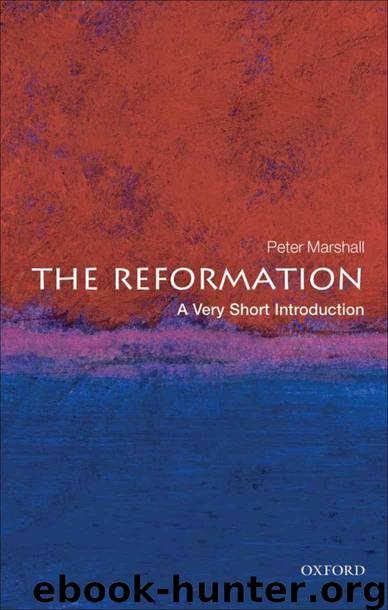The Reformation: A Very Short Introduction (Very Short Introductions) by Marshall Peter

Author:Marshall, Peter [Marshall, Peter]
Language: eng
Format: mobi, epub
Publisher: Oxford University Press
Published: 2009-10-21T16:00:00+00:00
Paths to resistance
If grudging official acceptance of religious minorities was a messy, pragmatic, and unexpected consequence of religious conflict, the Reformation also challenged the established status of political authority in more direct and self-conscious ways. The defiance of rulers by subjects of a different religious persuasion was a political fact on the ground, but the defiers wanted to feel legally and ethically justified in the steps they were taking. The result was another momentous development: an unprecedented theorizing of the limits of political obedience, and the articulation of fully fledged theories of subaltern resistance.
Of course, rebellion was not a new phenomenon in the 16th century, and rebels had always needed an excuse as well as a cause. The classic one was that insurgents were not really rebelling against the sovereign at all; they were acting to protect him from corrupt and wicked counsellors who had succeeded in leading him astray. This evasion still had legs in the Reformation era: it was the argument of the Yorkshire Catholic rebels who in 1536 rose against Henry VIII’s policies in a ‘Pilgrimage of Grace’. But as a basis for sustained ideological dissent, the argument was both implausible and impractical. Serious debates over the resistance question began in Lutheran Germany, as the Protestant princes considered options in the face of Charles V’s hostility. Lutheran theologians produced an ingenious amalgam of doctrines of political obligation and constitutional theory. All rulers had an inescapable duty to protect and preserve true religion; at the same time, the German princes were jointly responsible with the emperor for the good order of the empire. If he failed in his duty to uphold true religion, acting as a tool of the anti-christian pope, then he could legitimately be resisted. This was not a recipe for anarchy, but a narrowly defined set of circumstances under which ‘inferior magistrates’ might call the superior magistrate to account.
Calvin’s position was remarkably similar – he was not the revolutionary proponent of principled resistance he is sometimes cracked up to be. In the Institutes he observed merely that the constitutions of some states allowed for ‘defenders of the people’s freedom’ to guard against tyranny – the ephors of ancient Sparta, or the tribunes of Rome. Cautiously, he added that the estates or parliaments of modern kingdoms ‘perhaps’ performed the same function. But Calvin’s persistent diatribes against the horrors of ‘false’ worship, and the obligation on true Christians to shun it, were an invitation to at least passive resistance and civil disobedience. It was in response to actual persecutions, and the beginnings of Counter-Reformation in areas lacking the federated power structure of Germany, that some of Calvin’s followers developed less equivocal and more radical arguments. A trio of refugees from Mary Tudor’s England, Christopher Goodman, John Knox, and John Ponet, broke spectacularly from the notion that even ungodly rulers were (in the formula of St Paul) ‘ordained of God’, and concluded that wicked rulers could be overthrown or even killed – the doctrine of tyrannicide. Some French
Download
The Reformation: A Very Short Introduction (Very Short Introductions) by Marshall Peter.epub
This site does not store any files on its server. We only index and link to content provided by other sites. Please contact the content providers to delete copyright contents if any and email us, we'll remove relevant links or contents immediately.
| Buddhism | Christianity |
| Ethnic & Tribal | General |
| Hinduism | Islam |
| Judaism | New Age, Mythology & Occult |
| Religion, Politics & State |
Cecilia; Or, Memoirs of an Heiress — Volume 1 by Fanny Burney(31341)
Cecilia; Or, Memoirs of an Heiress — Volume 3 by Fanny Burney(30938)
Cecilia; Or, Memoirs of an Heiress — Volume 2 by Fanny Burney(30896)
The Secret History by Donna Tartt(16644)
Sapiens: A Brief History of Humankind by Yuval Noah Harari(13067)
Leonardo da Vinci by Walter Isaacson(11913)
The Radium Girls by Kate Moore(10914)
Sapiens by Yuval Noah Harari(4546)
The Wind in My Hair by Masih Alinejad(4427)
How Democracies Die by Steven Levitsky & Daniel Ziblatt(4407)
Homo Deus: A Brief History of Tomorrow by Yuval Noah Harari(4287)
Endurance: Shackleton's Incredible Voyage by Alfred Lansing(3852)
The Silk Roads by Peter Frankopan(3771)
Man's Search for Meaning by Viktor Frankl(3644)
Millionaire: The Philanderer, Gambler, and Duelist Who Invented Modern Finance by Janet Gleeson(3574)
The Rape of Nanking by Iris Chang(3522)
Hitler in Los Angeles by Steven J. Ross(3443)
The Motorcycle Diaries by Ernesto Che Guevara(3340)
Joan of Arc by Mary Gordon(3263)
